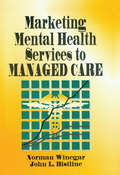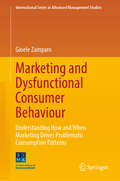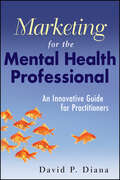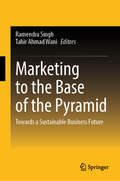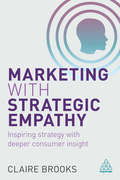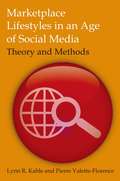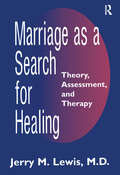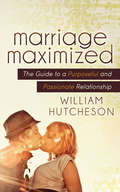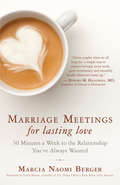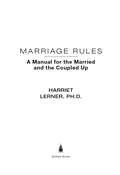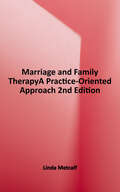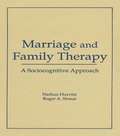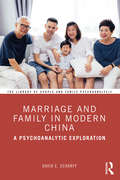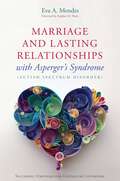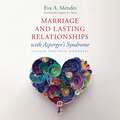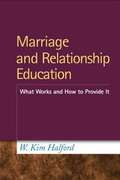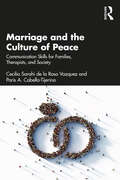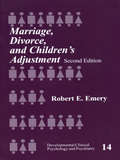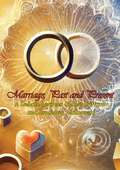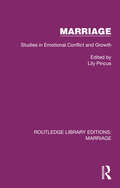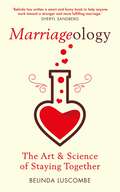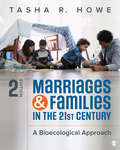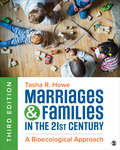- Table View
- List View
Marketing Mental Health Services to Managed Care
by William Winston Norman Winegar John BistlineManaged care is rapidly making traditional marketing strategies for mental health services obsolete. Here is the definitive book that helps professionals understand contemporary market forces and how to reshape marketing strategies in an increasingly competitive environment.Marketing Mental Health Services to Managed Care begins by demystifying the seemingly bewildering world of managed care systems. It enables the reader to become a fully informed partner in providing services for managed care systems. In an era in which many professionals are affiliated with one or more managed care networks, this book guides clinicians toward greater control of their professional futures by providing the steps necessary to develop a successful managed care oriented practice strategy. It will be especially helpful to the newcomer to practice in the 1990s or the seasoned practitioner interested in increasing referrals from managed care systems.Readers of this highly practical new book learn how to analyze the market for clinical services, how to plan and develop services for the managed care market, and how to sell professional services in an era dominated by active payor entities. The increased importance of automation, group practices, and effective office management skills are discussed. Although of particular value to outpatient practitioners, Marketing Mental Health Services to Managed Care also discusses marketing strategies and revenue generating ideas for inpatient mental health and substance abuse treatment facilities. Program managers, administrators, and marketing professionals in the hospital industry will find this book a valuable investment.Of special interest to all readers are chapters addressing the impact of managed care systems--with their focus on accountability, cost-effectiveness, and quality--upon traditional clinical paradigms. Brief therapy skills and techniques are discussed by these two veteran clinicians and writers. Emerging clinical innovations and effective reimbursement strategies are also discussed in this remarkable new book. A resource section, managed care company directory, and a glossary of terms make this a practical guidebook of long-lasting value to professionals from many disciplines. College professors and graduate students will also find Marketing Mental Health Services to Managed Care a valuable introduction to marketing professional services in the managed care dominated marketplace for healthcare today.
Marketing and Dysfunctional Consumer Behaviour: Understanding How and When Marketing Drives Problematic Consumption Patterns (International Series in Advanced Management Studies)
by Gioele ZamparoThis book explores the relationship between marketing practices and dysfunctional consumption behaviors, specifically focusing on two behavioral addictions: compulsive buying and problematic gambling. It offers a comprehensive analysis grounded in marketing theory, examining how marketing strategies and actions can significantly influence these behaviors. Using a mixed-method approach, the book reviews existing literature and presents empirical findings related to compulsive buying and gambling. It also discusses the implications of marketing’s role in fostering these behaviors, aiming to inform both academic discourse and the responsibilities of marketers. This work is essential for scholars and practitioners seeking to understand dysfunctional consumer behaviors and the impact of marketing strategies on consumer well-being.
Marketing for the Mental Health Professional
by David P. DianaA hands-on guide to building a successful mental health practice There is real opportunity for growth, advancement, and overall success within the mental health profession. Marketing for the Mental Health Professional helps you acquire and apply the powerful, proven sales and marketing techniques and strategies needed to create and cultivate a thriving mental health practice. Filled with real-life stories and helpful tips, this book provides you with the tools to build your practice, including guidance on: Using customer-based selling to create a thriving practice Developing effective strategies for engaging clients, building credibility, and earning loyalty Identifying true prospects that will lead to long-term success Using power, influence, and persuasion to help grow your practice Creating an impression and being remembered Using Internet technology to start a conversation and build relevance A practical guide for professionals looking to achieve long-term success in the field, Marketing for the Mental Health Professional proposes a different way of thinking about the profession. It leverages and incorporates key business, sales, and marketing principles that "best in class" organizations and sales/marketing professionals use to generate an increase in market share, financial wealth, and overall achievement.
Marketing to the Base of the Pyramid: Towards a Sustainable Business Future
by Ramendra Singh Tahir Ahmad WaniThis book is a collection of nine chapters discussing the impact of sustainable marketing and business practices on the stakeholders at the base of the pyramid (BoP). It explores multifaceted dimensions related to sustainable practices such as sustainable consumer behavior, marketplace literacy for low-income and low-literate consumers, innovation and BoP and emerging markets, bridging vulnerability and sustainability, inclusive marketing practices, and how to bridge the economic, social and environmental aspects of sustainability. These chapters have been authored by the best marketing scholars working in the domain of marketing at the base of the pyramid, including scholars who actively promote bottoms up approach to enhance well-being and prosperity of subsistence marketplaces. Primarily aimed at marketing scholars, another important objective of this edited book is to reach out to organizations looking for deeper insights on how they can successfully position their products and services to poor consumers, or even how they can purchase/source products and services from poor producers. Professional associations such as ASSOCHAM, CII, FICCI, AIMA, AMA would also find many relevant takeaways in the book, as would academicians and policymakers of developing nations in Asia, Americas and Africa.
Marketing with Strategic Empathy: Inspiring Strategy with Deeper Consumer Insight
by Claire BrooksWe are living in an age of continual motion and change, and as a result traditional strategy planning has become outmoded. Every manager, perhaps even every employee, needs to become a strategist. Every strategist, in turn, needs to develop deep consumer insight - or empathy - as a basis for flexible strategy formation. This book offers a practical guide on how to develop and implement a systematic process of strategic empathy to lead to greater effectiveness and day-to-day success. Marketing With Strategic Empathy is written by Claire Brooks, the CEO of the global consulting firm where the strategic empathy framework and processes were developed. She has applied these in many successful projects for international corporations for more than 10 years.
Marketplace Lifestyles in an Age of Social Media: Theory And Methods
by Lynn R Kahle Pierre Valette-FlorenceThis book approaches the concept of lifestyle from a contemporary scholarly perspective, and subjects it to rigorous theoretical and conceptual standards from an integrated, applied psychological point of view. Marketplace Lifestyles in an Age of Social Media is exceptionally current, demonstrating how recent trends and developments in social media reflect the importance of lifestyle research in marketing. Numerous examples, illustrations, and comprehensive references are provided, making this volume the best single resource for scholars, students, and marketing experts in this important area of marketing theory and practice.
Marriage A Search For Healing
by Jerry M. LewisFirst published in 1997. Routledge is an imprint of Taylor & Francis, an informa company.
Marriage Maximized: The Guide to a Purposeful and Passionate Relationship
by William HutchesonMarriage Maximized helps couples whose marriages have drifted off track, steer them back onto the path to happiness. With thirty-eight years of experience helping nearly-weds and established couples, William Hutcheson is ready to help married couples have the happy relationship God intended for their marriage. In Marriage Maximized, couples learn:A transformative, new definition of love that promises to renew their marriageThe secret that turns personality differences from stresses into strengths How to ensure romance in their marriage – yes, that’s a guarantee! Communication strategies to resolve all those little misunderstandings (without the fights!) The importance of taking marriage fun seriously Why their marriage happiness quotient tanked – and how to get it back
Marriage Meetings for Lasting Love: 30 Minutes a Week to the Relationship You've Always Wanted
by Marcia Naomi BergerMost couples — because they watch so many of their peers divorce and are themselves the products of failed marriages — don't have many successful long-term-relationship role models. Parenting and communication issues are perennial, while some challenges, like increasingly 24-7 work lives and economic hardships, mark the current decade. Despite all this, psychotherapist and clinical social worker Marcia Naomi Berger asserts that most couples can make love last — they just need to learn how. Berger answers this need with a deceptively simple prescription: have an interruption-free thirty-minute (or even shorter) meeting each week and follow an agenda that includes the kind of appreciation and planning for fun that foster intimacy and pave the way for collaborative conflict resolution. Berger has refined these techniques while working with hundreds of couples — with results that are both practical and profound.
Marriage Rules: A Manual for the Married and the Coupled Up
by Harriet LernerFollowing a unique format perfect for today's world, the renowned author of The Dance of Anger gives us just over 100 rules that cover all the hot spots in long-term relationships. Marriage Rules offers new solutions to age-old problems ("He won't talk"/"She doesn't want sex") as well as modern ones (your partner's relationship to technology. ) You'll also learn how to: Calm things down and warm them up Talk straight and fight fair Listen well as a spiritual practice Connect with a distant partner Survive the unique challenges of children, stepchildren and difficult- laws Follow a 12-step program to overcome defensiveness Know how and when to draw the line Take back your marriage when things fall apart Marriage Rules is a treasure chest of lively, practical advice to help you navigate your couple relationship with clarity, courage, and joyous conviction. If one person in a couple follows ten rules of his or her choice, it will generate a major, positive change. All that's required is a genuine wish for a better relationship and a willingness to practice. .
Marriage and Family Therapy: A Practice-Oriented Approach
by Linda MetcalfThis text provides students of family therapy with a unique opportunity to understand and compare the inner workings of 14 traditional and non-traditional family therapy models. The book demonstrates, through innovative " guiding templates,"" how the different therapeutic models are applied in an actual family therapy situation. The second edition features a new chapter on neuroscience, new interviews with master therapists on topics such as LGBT families, EMDR and research, and coverage of ethical issues concerning electronic safety and telephonic therapy. Overviews of every model include history, views of change, views of the family, and the role of the therapist. Chapters on every model also provide responses to one, realistic case study with commentary and analysis by master therapists to illustrate how each one addresses the same scenario. Interviews with master therapists illustrate how each mode of therapy actually ""works"" and how therapists ""do it."" Print version of the book includes free, searchable, digital access to the entire contents New to the Second Edition: - Examines neuroscience and its role in family therapy - New chapter on solution focused narrative therapy with families - Includes enhanced coverage of self-care and mindfulness for the therapist - Contains educator resources including instructor's manual, PowerPoint slides, and a test bank - Updated references provide current developments in the field of marriage and family therapy - Provides insight on submitting research articles for publication through an interview with a current journal editor - Reports on current, revised ethical guidelines from the AAMFT Key Features: - Provides a guiding template for each family therapy model from assessment through termination - Describes a practice-oriented approach to family therapy - Uses a single case study throughout the book where different approaches to therapy are applied by master therapists - Introduces the theory, history, theoretical assumptions, techniques, and components of each model - Includes numerous interviews, case study commentary, and analyses by master therapists.
Marriage and Family Therapy: A Sociocognitive Approach
by Terry S Trepper Roger A Straus Faye HurvitzMarriage and Family Therapy: A Sociocognitive Approach is a comprehensive and clearly written introduction to sociocognitive therapy. It is rich with transcripts and case examples, culled from the authors’more than thirty-five years of practice, providing you with valuable background information on helping difficult-to-reach and hard-to-help populations. In practical language, this volume takes you step-by-step through methods of assessment and change that are useful in traditional and nontraditional families and couples. With clear language and taxonomy for family troubles and their resolution, Marriage and Family Therapy provides conceptual handles to guide you in learning intervention strategies, enabling you to work effectively with, most notably, lower working-class and poor inner-city, African-American families. A highlight of the book is the detailed look at terminal and instrumental interaction hypotheses and how they can be applied in actual therapy situations. With Marriage and Family Therapy as a guide, you will develop multiple skills and methods that equip you to better handle the challenging task of helping troubled families and couples.The first two chapters present the theoretical framework of the sociocognitive approach. In the third chapter, the assessment and change concepts central to Dr. Hurvitz's approach are introduced. The last four chapters show how these humanist principles are applied through the phases of opening, change-producing, and termination in therapy, creating an invaluable book for marriage and family therapists, social workers, psychologists, and educators.
Marriage and Family in Modern China: A Psychoanalytic Exploration (The Library of Couple and Family Psychoanalysis)
by David E. ScharffMarriage and Family in Modern China is a groundbreaking psychoanalytic examination of how 70 years of widespread social change have transformed the intimacies of life in modern China. The book describes the evolution of marriage and family structure, from the ancient tradition of large families preferring sons, arranged marriages and devaluation of girls, to a contemporary dominance of free-choice marriages and families that now prefer to remain small even after the ending of the One Child Policy. David Scharff uses extensive reports of his psychoanalytic interventions to demonstrate how the residue of widespread trauma suffered by Chinese families during past centuries has interacted with the effects of rapid modernization to produce new patterns of individual identity, personal ambition and family structure. This wholly original book offers new insight into Chinese families for all those interested in psychoanalytic psychotherapy and in the intricacies of Chinese domestic life.
Marriage and Lasting Relationships with Asperger's Syndrome (Autism Spectrum Disorder): Successful Strategies for Couples or Counselors
by Stephen M. Shore Eva A. MendesProven counseling strategies that will help improve the relationships of married, long-term or co-habiting couples with Asperger's Syndrome (Autism Spectrum Disorder). ASD relationship expert Eva A. Mendes provides advice straight from the couples' counselling room that can be applied in day-to-day living and help with the challenges that can arise in relationships where one or both partners are on the autism spectrum. This includes issues surrounding diagnosis, mental health, sexual compatibility, sensory needs, executive functioning, theory of mind, communication, and co-parenting. She offers unique practical ideas for positive change such as creating a relationship schedule, making expression of appreciation and gratitude a part of every day, and finding mutually satisfying activities and special interests to engage in with your partner. The strategies in this book will be useful to couples themselves and any couples' counselors or therapists working with them.
Marriage and Lasting Relationships with Asperger's Syndrome (Autism Spectrum Disorder): Successful Strategies for Couples or Counselors
by Eva A. MendesProven counseling strategies that will help improve the relationships of married, long-term or co-habiting couples with Asperger's Syndrome (Autism Spectrum Disorder).ASD relationship expert Eva A. Mendes provides advice straight from the couples' counselling room that can be applied in day-to-day living and help with the challenges that can arise in relationships where one or both partners are on the autism spectrum. This includes issues surrounding diagnosis, mental health, sexual compatibility, sensory needs, executive functioning, theory of mind, communication, and co-parenting. She offers unique practical ideas for positive change such as creating a relationship schedule, making expression of appreciation and gratitude a part of every day, and finding mutually satisfying activities and special interests to engage in with your partner. The strategies in this book will be useful to couples themselves and any couples' counselors or therapists working with them.
Marriage and Relationship Education
by W. Kim Halford Jeffry LarsonGrounded in extensive research and clinical experience, this indispensable book addresses the "whats," "whys," and "how-tos" of conducting effective marriage and relationship education. Leading authority W. Kim Halford reviews a range of contemporary models and provides an in-depth description of his own approach, Couple CARE. Session-by-session guidelines for therapists show how to help groups or individual couples including those facing major life changes or stressors foster closeness and communication, manage conflicts, and prevent common relationship problems. The book also explains how to use commercially available online assessment tools to help each couple develop their own relationship goals. It includes 35 reproducible handouts and forms.
Marriage and the Culture of Peace: Communication Skills for Families, Therapists, and Society
by Cecilia Sarahi de la Rosa Vazquez Paris A. Cabello-TijerinaThis book provides skills for therapists and families to help improve interpersonal communication, promoting a new system of family coexistence and a refreshed concept of the modern marriage in society. Written from a constructivist peace perspective, the book’s aim is to reduce the high statistics of intimate partner violence that occurs in Mexico, arguing that the culture of peace and how it is born in the family in turn affects society for better or for worse. Based upon interviews from 150 long-term married couples, the chapters address the components that promote peaceful dialogue in marriages, such as assertive language, active listening, tolerance to frustration, and gender perspectives. Including accessible language and several models of peace, the book uniquely examines same-sex marriages, the role of children in marriage conflicts, and prescribed gender assumptions and roles in relationships. It aims to empower family members to move away from old habits and seek a more equitable existence in marriages and society at large. This interdisciplinary text will be of great interest to family therapists and clinical social workers, as well as to students and researchers in communication and peace studies.
Marriage, Divorce, and Children's Adjustment
by Dr Robert E. EmeryThis completely updated second edition presents an integrated, multidisciplinary account of children's experiences of divorce from historical, cultural and demographic perspectives. The author highlights children's resilience, but is sensitive to children's pain throughout the divorce process and afterwards. In addition he reviews the psychological, social, economic and legal consequences of divorce, and examines how children's risk is predicted by parental conflict, relationships with both parents, financial strain, custody disputes, and other factors. The author uses his family systems model to integrate research findings into a theoretical whole and to evaluate psychological interventions with divorcing and divorced families.
Marriage, Past and Present: A Debate between Robert Briffault and Bronislaw Malinowski
by Bronislaw Malinowski Robert BriffaultDelve into the fascinating and thought-provoking world of anthropological and sociological discourse with Marriage, Past and Present: A Debate between Robert Briffault and Bronislaw Malinowski. This compelling work captures the intellectual clash between two of the early 20th century's most prominent scholars as they explore the evolution and significance of marriage in human societies.Robert Briffault, a noted anthropologist and sociologist, and Bronislaw Malinowski, a pioneering figure in social anthropology, bring their distinctive perspectives and expertise to this vigorous debate. Through a series of essays and counterarguments, they examine the historical development of marriage, its cultural variations, and its role in contemporary society.Briffault, known for his critical views on the institution of marriage, argues that marriage has evolved primarily as a social contract influenced by economic and political factors. He challenges traditional notions of marriage as a natural and universal institution, proposing instead that it is a construct shaped by specific historical and cultural contexts.In contrast, Malinowski, celebrated for his fieldwork and functionalist approach, defends the idea of marriage as a fundamental and universal aspect of human societies. He emphasizes the biological and social functions of marriage, including the regulation of sexual relations, the rearing of children, and the establishment of kinship networks.Join Robert Briffault and Bronislaw Malinowski in this enlightening and engaging exploration of marriage, and discover the varied interpretations and meanings of this enduring social institution. Marriage, Past and Present is a timeless contribution to the study of human relationships and cultural evolution.
Marriage: Studies in Emotional Conflict and Growth (Routledge Library Editions: Marriage)
by Lily Pincus‘What are marriage difficulties really all about?’ This fundamental question, and the allied one of how help can be given to those in trouble in their marriages, constitute the theme of this book. Originally published in 1960, the authors were a group of caseworkers who over the previous ten years had treated and studied the problems of about 2,000 married couples. They worked as a closely-knit specialist unit in co-operation with psychiatric consultants from the Tavistock Clinic. The work is based on the psycho-analytic theory of personality development and human relationships. This theory is supported by five detailed case-studies which form the central part of the book. The main purpose is to demonstrate the particular therapeutic technique which has been evolved. The book would have been of interest to social workers, doctors and all who were concerned to make marriages as rich a source of happiness as possible at the time. Today it can be read and enjoyed in its historical context.
Marriageology: The Art and Science of Staying Together
by Belinda LuscombeThe fault lines that can fracture a marriage are all contained in these six words: FAMILIARITY, FIGHTING, FAMILY, FINANCES, FOOLING AROUND AND FINDING HELP. It&’s time to get to know your F words. Using the latest scientific research, personal anecdotes and expert advice, award-winning journalist Belinda Luscombe argues that marriage is good for your health, your finances and your happiness. But it isn&’t always easy! Focusing on what Belinda describes as her F words, she presents facts, debunks myths, and provides an entertaining mix of data, anecdotes and wisdom from a wide range of approaches to married life, drawing on the work of experts from within the marriage and divorce industries. A brilliant guide to staying together, Marriageology offers helpful advice and gives readers something to think about whether your marriage is on the brink of collapse or just needs a bit of maintenance.
Marriages and Families in the 21st Century: A Bioecological Approach
by Dr Tasha R. HoweMarriages and Families in the 21st Century puts contemporary relationships and family structures in context for today’s students. Using a bioecological framework, the book reveals how families are shaped by multiple influences, from biological to cultural, that interact with one another. Chapters cover topics from parenting to gender issues within an interdisciplinary context, weaving in stories, visuals, and examples of diverse families to dispel longstanding myths. The book creates a personalized learning experience with frequent self-assessments and strengths exercises, while ensuring that students come to understand the research and build scientific analysis and critical thinking skills along the way. Robust digital tools and resources including SAGE edge and an interactive eBook with SAGE Premium Video help readers develop a multi-layered understanding of "what makes families tick" while challenging them to re-evaluate their own assumptions and experiences.
Marriages and Families in the 21st Century: A Bioecological Approach
by Dr Tasha R. HoweMarriages and Families in the 21st Century puts contemporary relationships and family structures in context for today’s students. Using a bioecological framework, the book reveals how families are shaped by multiple influences, from biological to cultural, that interact with one another. Chapters cover topics from parenting to gender issues within an interdisciplinary context, weaving in stories, visuals, and examples of diverse families to dispel longstanding myths. The book creates a personalized learning experience with frequent self-assessments and strengths exercises, while ensuring that students come to understand the research and build scientific analysis and critical thinking skills along the way. Robust digital tools and resources including SAGE edge and an interactive eBook with SAGE Premium Video help readers develop a multi-layered understanding of "what makes families tick" while challenging them to re-evaluate their own assumptions and experiences.
Marriages and Families in the 21st Century: A Bioecological Approach
by Tasha R. HoweIn Marriages and Families in the Twenty-First Century: A Bioecological Approach, Tasha R. Howe′s unique micro-to-macro perspective invites all readers to explore the full complexity of contemporary relationships and family structures within their ever-changing social, cultural, psychological, and biological frameworks. The illuminating narrative leads students into the future of the field by uniting the latest developmental science with everyday examples that place the individual within the context of family, peers, neighbors, teachers, schools, media, religious institutions, and culture. The Third Edition encourages students to analyze and apply the material with abundant self-reflection exercises, self-assessments, case studies, and critical-thinking questions, providing them with a firm grasp of the research as well as concrete tools to use in their own lives, relationships, and careers. This title is accompanied by a complete teaching and learning package. Contact your SAGE representative to request a demo. Learning Platform / Courseware SAGE Vantage is an intuitive learning platform that integrates quality SAGE textbook content with assignable multimedia activities and auto-graded assessments to drive student engagement and ensure accountability. Unparalleled in its ease of use and built for dynamic teaching and learning, Vantage offers customizable LMS integration and best-in-class support. It’s a learning platform you, and your students, will actually love. Learn more. Assignable Video with Assessment Assignable video (available in SAGE Vantage) is tied to learning objectives and curated exclusively for this text to bring concepts to life. Watch a sample video now. LMS Cartridge: Import this title’s instructor resources into your school’s learning management system (LMS) and save time. Don’t use an LMS? You can still access all of the same online resources for this title via the password-protected Instructor Resource Site. Learn more.
Marriages and Families in the 21st Century: A Bioecological Approach
by Tasha R. HoweIn Marriages and Families in the Twenty-First Century: A Bioecological Approach, Tasha R. Howe′s unique micro-to-macro perspective invites all readers to explore the full complexity of contemporary relationships and family structures within their ever-changing social, cultural, psychological, and biological frameworks. The illuminating narrative leads students into the future of the field by uniting the latest developmental science with everyday examples that place the individual within the context of family, peers, neighbors, teachers, schools, media, religious institutions, and culture. The Third Edition encourages students to analyze and apply the material with abundant self-reflection exercises, self-assessments, case studies, and critical-thinking questions, providing them with a firm grasp of the research as well as concrete tools to use in their own lives, relationships, and careers. This title is accompanied by a complete teaching and learning package. Contact your SAGE representative to request a demo. Learning Platform / Courseware SAGE Vantage is an intuitive learning platform that integrates quality SAGE textbook content with assignable multimedia activities and auto-graded assessments to drive student engagement and ensure accountability. Unparalleled in its ease of use and built for dynamic teaching and learning, Vantage offers customizable LMS integration and best-in-class support. It’s a learning platform you, and your students, will actually love. Learn more. Assignable Video with Assessment Assignable video (available in SAGE Vantage) is tied to learning objectives and curated exclusively for this text to bring concepts to life. Watch a sample video now. LMS Cartridge: Import this title’s instructor resources into your school’s learning management system (LMS) and save time. Don’t use an LMS? You can still access all of the same online resources for this title via the password-protected Instructor Resource Site. Learn more.
